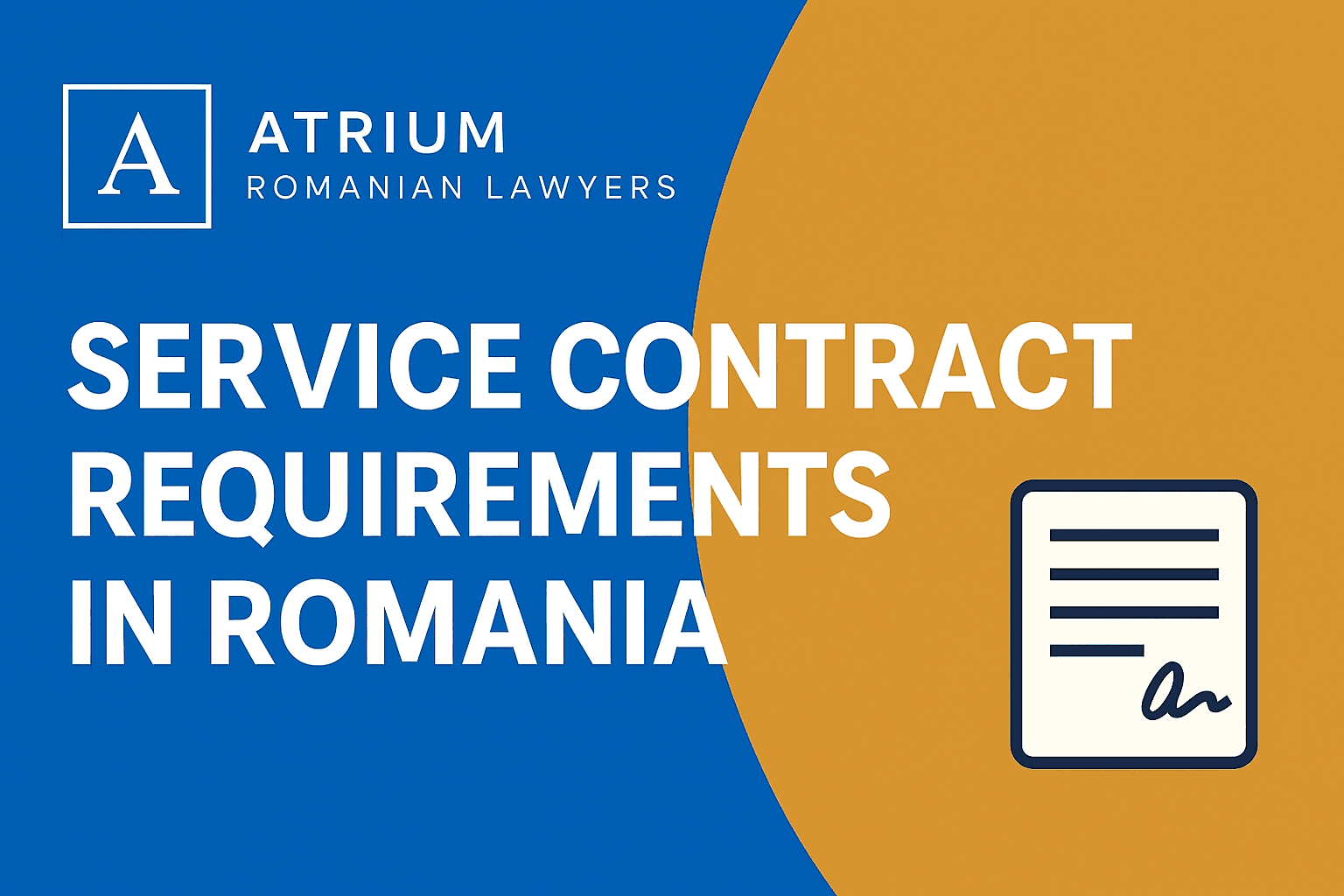Service Contract Requirements Romania: What Every Provider Must Include by Law
Service Contract Requirements Romania – What Every Provider Must Include by Law
Service contracts in Romania must meet specific legal requirements under Government Order 21/1992 and related consumer protection laws. This comprehensive guide explains what Romanian law requires for valid service contracts, how ANPC enforces these rules, and what happens when businesses fail to comply.
Need Professional Help?
At our law firm, Atrium Romanian Lawyers, we assist clients with corporate & commercial law, contract drafting, and consumer protection advisory.
Test Your Service Contract Compliance
Use our interactive compliance checker below to verify that your service contract meets all Romanian legal requirements. This tool guides you through the 12 mandatory elements and helps you avoid ANPC penalties ranging from RON 2,000 to RON 100,000.
Interactive Service Contract Compliance Checker
Check off each requirement as you review your contract. The bar above will fill as you reach compliance.
📹 Video Guide: Understanding Romanian Service Contracts
Watch our comprehensive video explanation covering all mandatory requirements, ANPC enforcement, and practical tips for compliance.
What Is a Service Contract Under Romanian Law?
Legal Definition
Under Romanian law, a service contract (contract de servicii) is an agreement where one party (the service provider) undertakes to provide specific services to another party (the consumer) in exchange for payment. Service contracts are governed by the Romanian Civil Code (Articles 1851-1874), Government Order 21/1992 on consumer protection, and Law 296/2004 (Consumer Code).
Types of Services Covered
Romanian service contract regulations apply to telecommunications and internet services, banking and financial services, utility services, professional services, maintenance and repair services, installation and delivery services, educational and training services, healthcare services, and transportation services.
Are Service Contracts Mandatory in Romania?
Yes, written service contracts are mandatory for most consumer-business transactions in Romania. According to Government Order 21/1992, service providers must formalize their agreements with consumers in writing, particularly when the service involves recurring payments, the contract duration exceeds 30 days, or the total value exceeds RON 100.
Mandatory Elements: What Must a Romanian Service Contract Contain?
1. Party Identification Requirements
Every service contract must clearly identify both parties. The service provider must include their legal business name, unique registration code (CUI), trade register number, physical headquarters address, and contact information. The consumer must include their full legal name, personal identification number (CNP) for individuals, and contact address.
2. Service Description Requirements
Contracts must provide detailed specifications including the exact nature of services, quality standards and performance metrics, delivery timeline and schedule, geographic service area, equipment or materials included, and technical specifications. According to ANPC regulations, vague or ambiguous service descriptions are considered non-compliant.
3. Pricing and Fee Disclosure
Complete transparency on all costs is mandatory. This includes the base service price, all additional fees (connection, activation, installation), taxes and surcharges (VAT, excise duties), recurring charges (monthly, annual), variable costs (usage-based fees), penalty fees (late payment, early termination), currency, payment methods accepted, and billing cycle and due dates. Key requirement: Prices must be displayed in 10-point font or larger.
4. Contract Duration and Renewal Terms
Contracts must specify the start date of service provision, contract duration (fixed term or indefinite), automatic renewal conditions, notice period for termination, early termination rights and associated costs, and grace periods if applicable.
5. Modification and Amendment Procedures
Romanian law requires clear procedures for contract changes. Service providers must provide 30 days written notice before any unilateral changes, specify the exact changes to terms or pricing, inform consumers of their right to reject changes, and allow penalty-free termination if consumer refuses modifications.
6. Service Suspension and Termination Rules
Contracts must outline conditions for service suspension by provider, consumer notification requirements (15 days advance notice), consumer’s right to unilateral termination (30 days notice, no penalties), provider penalties for failing to deliver promised services, refund procedures for prepaid services, and equipment return requirements.
7. Consumer Protection Clauses
Mandatory consumer rights provisions include withdrawal right (14 days for distance contracts), warranty and guarantee terms, complaint and dispute resolution procedures, service quality standards, compensation for provider-caused damages, data privacy protections, and right to refuse data processing for marketing purposes.
8. Liability and Indemnification
Contracts must clearly state the service provider’s liability for non-performance, consumer compensation rights for damages, force majeure provisions, and limitation of liability clauses that must be reasonable and non-abusive.
9. Dispute Resolution Mechanisms
Required information includes complaint filing procedures, internal complaint handling timeline, alternative dispute resolution (ADR) options, ANPC contact information, and court jurisdiction.
Penalties for Non-Compliant Service Contracts
Fine Structure
| Violation Type | Fine Amount |
|---|---|
| Missing mandatory contract elements | RON 2,000 – RON 4,000 |
| Abusive clauses | RON 20,000 – RON 100,000 |
| Large-scale violations (100+ consumers) | Up to 4% of annual turnover |
Additional Penalties
Beyond monetary fines, penalties can include temporary service suspension until compliance, permanent product/service withdrawal from market, publication of violation on ANPC website, consumer compensation orders, and court-ordered contract modifications.
Prohibited Abusive Clauses Under Romanian Law
Law 193/2000 on unfair contract terms prohibits clauses that exclude or limit provider liability for damages, allow unilateral price increases without justification, bind consumer while making provider obligations conditional, impose disproportionate penalties on consumers, extend contract automatically without clear terms, restrict consumer’s right to legal action, or transfer provider obligations to third parties without consent.
Legal consequence: Abusive clauses are automatically void, even if signed by the consumer.
Consumer Rights in Romanian Service Contracts
Core Consumer Rights
Under Government Order 21/1992, consumers have the right to complete, accurate information about services, unilateral contract termination (30 days notice, no penalties), protection against unfair terms, compensation for damages caused by provider, refuse data sharing for marketing, alternative dispute resolution, and 14-day withdrawal period for distance contracts.
Withdrawal Right (Distance Contracts)
For services purchased online or off-premises, you have a 14-day cooling-off period from contract signing with full refund for unused services. No justification is required and no penalties apply for exercising the withdrawal right, except for services fully performed with consumer’s advance consent.
Recent Legal Updates (2024-2025)
Emergency Government Ordinance 58/2022
Key changes effective May 28, 2022 include increased fines for abusive clauses, 3-year statute of limitations for ANPC sanctions, and enhanced powers to remove abusive clauses from all contracts.
ANPC Order 539/2024: “Shrinkflation” Rules
New requirements effective October 10, 2024 require businesses to inform consumers of product size/weight reductions, provide specific labeling for reduced quantities, and face penalties for non-disclosure.
Law 243/2024: Consumer Credit
New protections effective November 27, 2024 include limited total cost of credit, interest rate caps, and enhanced disclosure requirements.
Useful Resources & Links
Romanian Government Agencies
- ANPC (Consumer Protection) – Enforcement authority for service contracts
- ANCOM (Telecommunications) – Specific rules for telecom contracts
- ASF (Financial Services) – Financial services regulations
- Ministry of Justice – Legal oversight
Atrium Romanian Lawyers Services
FAQ – Service Contract Requirements in Romania
Q: Do all service contracts need to be in writing?
A: Yes, most consumer-business service contracts must be in writing, especially if they involve recurring payments, exceed 30 days duration, or total over RON 100. Verbal contracts are valid only for simple, low-value, one-time services.
Q: What happens if my service contract doesn’t include mandatory clauses?
A: The contract may be void or unenforceable. ANPC can fine the provider RON 2,000-4,000 for missing elements. Consumers can challenge the contract and seek modifications or termination without penalties.
Q: Can service providers unilaterally change contract terms?
A: No, not without proper procedure. Providers must give 30 days written notice of any changes and inform consumers of their right to reject the modifications and terminate the contract without penalties.
Q: What is the penalty for using abusive clauses?
A: Fines range from RON 20,000 to RON 100,000 per violation. For large-scale violations, penalties can reach up to 4% of the provider’s annual turnover in Romania. Abusive clauses are automatically void.
Q: How long do I have to withdraw from a service contract?
A: For distance or off-premises contracts, you have 14 days from signing to withdraw without giving a reason and without penalties, provided the service hasn’t been fully performed with your advance consent.
Disclaimer: This article is for general information only and does not constitute legal advice. Please consult with a qualified Romanian corporate lawyer to verify current laws and regulations before finalizing your service contracts. Laws and procedures are subject to change, and individual circumstances may vary.

